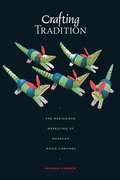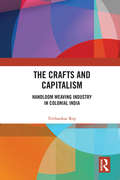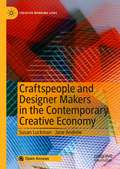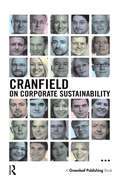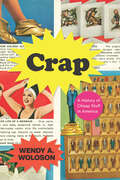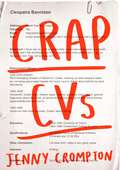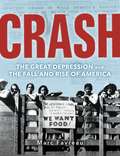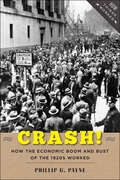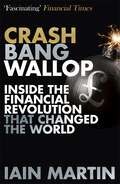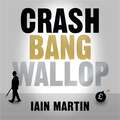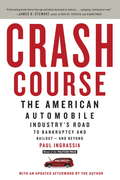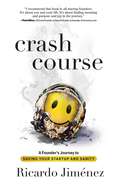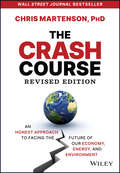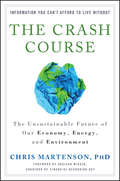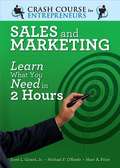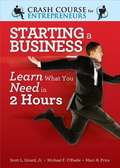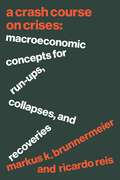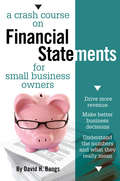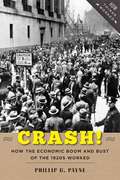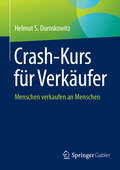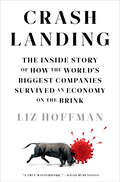- Table View
- List View
Crafting Tradition: The Making and Marketing of Oaxacan Wood Carvings
by Michael ChibnikSince the mid-1980s, whimsical, brightly colored wood carvings from the Mexican state of Oaxaca have found their way into gift shops and private homes across the United States and Europe, as Western consumers seek to connect with the authenticity and tradition represented by indigenous folk arts. Ironically, however, the Oaxacan wood carvings are not a traditional folk art. Invented in the mid-twentieth century by non-Indian Mexican artisans for the tourist market, their appeal flows as much from intercultural miscommunication as from their intrinsic artistic merit. In this beautifully illustrated book, Michael Chibnik offers the first in-depth look at the international trade in Oaxacan wood carvings, including their history, production, marketing, and cultural representations. Drawing on interviews he conducted in the carving communities and among wholesalers, retailers, and consumers, he follows the entire production and consumption cycle, from the harvesting of copal wood to the final purchase of the finished piece. Along the way, he describes how and why this "invented tradition" has been promoted as a "Zapotec Indian" craft and explores its similarities with other local crafts with longer histories. He also fully discusses the effects on local communities of participating in the global market, concluding that the trade in Oaxacan wood carvings is an almost paradigmatic case study of globalization.
The Crafts and Capitalism: Handloom Weaving Industry in Colonial India
by Tirthankar RoyThis book presents a comprehensive history of handloom weaving industry in India to challenge and revise the view that competition from machine-produced textiles destroyed the country’s handicrafts as claimed by historians until recently. It shows that skill-intensive handmade textiles survived the competition on a large scale, and that handmade goods and high-quality manual labour played a positive role in the making of modern India. Rich in archival material, The Crafts and Capitalism explores themes such as the historiography of craft technologies; statistical work on nineteenth-century cotton cloth production trends; narratives of merchants, the social leaders, the factory-owners; tools and techniques; and, shift from handloom to power loom. The book argues that changes in the handloom industry were central to the consolidation of new forms of capitalism in India. An important intervention in Indian economic history, this book will be useful to scholars and researchers of Indian history, economic history, colonial history, modern history, political history, labour history and political economy. It will also interest nongovernmental organizations, textile historians, and design specialists.
Craftspeople and Designer Makers in the Contemporary Creative Economy (Creative Working Lives)
by Susan Luckman Jane AndrewThis open access book explores the experience of working as a craftsperson or designer maker in the contemporary creative economy. The authors utilise evidence from the only major empirical study to explore the skills required and the challenges facing contemporary makers in an increasingly crowded marketplace. Drawing upon 180 interviews with peak organisations, established and emerging makers, and four years of fieldwork across Australia, this book offers a unique insight into the motivations informing those who seek to make an income from their craft or designer maker practice, as well as the challenges and opportunities facing them as they do so at this time of renewed interest internationally in the artisanal and handmade. Offering a rich and deep collection of real-life experiences, this book is aimed both at an academic and practitioner audience.
Craig Parks (A)
by David A. Thomas Lisa ChadderdonCraig Parks is a 1992 HBS graduate who, without much deliberation, returns to work for his former employer, Taylor Burton on Wall Street. The choice proves to be a poor fit for Craig. The case documents his decision-making process, personal history, and the dilemma he confronts once he realizes returning to Taylor Burton was the wrong decision.
Cranfield on Corporate Sustainability
by David GraysonBusiness schools have a special contribution to make in developing globally responsible, critical and independent-thinking future leaders and managers. In fact, the Cranfield School of Management acknowledges this as one of its important responsibilities. Its core ideology is to transform the practice of learning and create leaders who action their knowledge and become stewards of the common good. Such thinking forms the basis of this book and its theme of developing responsible and ethical leaders for next-generation enterprises. These leaders will be passionate, purposeful and responsible; their primary aim will be to make a difference in the lives of people and create sustainable value premised on sound ethical values. This book aims to provide a roadmap both for business students – the leaders of tomorrow – and for existing and engaged leaders who need support, coaching and counselling to address the challenges of the sustainability agenda. With contributions from more than thirty Cranfield faculty and associates across multiple management disciplines, the book emphasizes the need for cross-disciplinarity when confronting sustainability dilemmas. Many corporate responsibility practitioners find themselves isolated from core business issues. Conversely, many managers in traditional departments have little or no knowledge of what sustainability and corporate responsibility means to their day-to-day role. Today, there is an urgent need for learning, for conversation and for sustainability to become embedded throughout an organization's DNA. Cranfield strives to prepare its students for a work milieu that is increasingly complex, diverse, technologically interconnected, socially networked and where economic and political power shifts see emerging-market economies assuming significant global prominence. This makes for exciting challenges but also requires new mind-sets for the next generation of business men and women. Corporate responsibility, and the tough ethical and governance choices managers have to grapple with, where there are no easy answers, means that business education must embrace the stakeholder model. Leaders need to be able to negotiate their way with confidence around multiple perspectives and conflicting and common interests of stakeholders such as employees and managers, shareholders, trade unions, suppliers and civil society organisations. Business schools need to generate understanding of and sensitivity to this new and changing world of work. Today, the challenge for business schools and business itself is to establish a new maxim: "the business of business is sustainable business". Cranfield on Corporate Sustainability is designed to stimulate debate about what sustainable development means for business and, therefore, on what business schools across the globe should research, teach and advise. This unique book is a manifesto for a new holistic, embedded approach to corporate sustainability management education.
Crap: A History of Cheap Stuff in America
by Wendy A. WolosonCrap. We all have it. Filling drawers. Overflowing bins and baskets. Proudly displayed or stuffed in boxes in basements and garages. Big and small. Metal, fabric, and a whole lot of plastic. So much crap. Abundant cheap stuff is about as American as it gets. And it turns out these seemingly unimportant consumer goods offer unique insights into ourselves—our values and our desires. In Crap: A History of Cheap Stuff in America, Wendy A. Woloson takes seriously the history of objects that are often cynically-made and easy to dismiss: things not made to last; things we don't really need; things we often don't even really want. Woloson does not mock these ordinary, everyday possessions but seeks to understand them as a way to understand aspects of ourselves, socially, culturally, and economically: Why do we—as individuals and as a culture—possess these things? Where do they come from? Why do we want them? And what is the true cost of owning them? Woloson tells the history of crap from the late eighteenth century up through today, exploring its many categories: gadgets, knickknacks, novelty goods, mass-produced collectibles, giftware, variety store merchandise. As Woloson shows, not all crap is crappy in the same way—bric-a-brac is crappy in a different way from, say, advertising giveaways, which are differently crappy from commemorative plates. Taking on the full brilliant and depressing array of crappy material goods, the book explores the overlooked corners of the American market and mindset, revealing the complexity of our relationship with commodity culture over time. By studying crap rather than finely made material objects, Woloson shows us a new way to truly understand ourselves, our national character, and our collective psyche. For all its problems, and despite its disposability, our crap is us.
Crap CVs
by Jenny CromptonA HILARIOUS COMPILATION OF THE WORST JOB APPLICATIONS IMAGINABLE - A PERFECT STOCKING FILLER OR OFFICE SECRET SANTA GIFT THIS CHRISTMAS. Ever read a truly terrible job application? Or perhaps slightly exaggerated the truth on one of your own...We've all been there - but these are worse. So much worse. From overly-honest cover letters, embarrassing typos, and mortifying personal revelations, to awkward interview questions, misplaced self-confidence, and, of course, outright lies. This hilarious collection of shockingly dreadful job applications, crap CVs and excruciating interviews will have you laughing out loud, while also making you feel so much better about yourself - because at least you weren't ever this bad . . .Application for EmploymentI refer to the recent death of the Technical Manager at your company and hereby apply for the replacement of the deceased manager.Each time I apply for a job, I get a reply that there is no vacancy but in this case I have caught you red-handed and you have no excuse because I even attended the funeral to be sure that he was truly dead and buried before applying.Attached to my letter is a copy of my CV and his death certificate.The Interview:Q. Is there anything about this job that you feel you might not be very good at?A. Dealing with people.Q. What person, living or dead, would you most like to meet?A. The living one.
Crash: The Great Depression and the Fall and Rise of America
by Marc FavreauThe incredible true story of how real people weathered one of the most turbulent periods in American history—the Great Depression—and emerged triumphant. From the sweeping consequences of the stock market crash to the riveting stories of individuals and communities caught up in a real American dystopia, discover how the country we live in today was built in response to a time when people from all walks of life fell victim to poverty, insecurity, and fear. Meet fascinating historical characters like Herbert Hoover, Franklin Delano and Eleanor Roosevelt, Frances Perkins, Dorothea Lange, Walter White, and Mary McLeod Bethune. See what life was like for regular Americans as the country went from the highs of the Roaring Twenties to the lows of the Great Depression, before bouncing back again during World War II. Explore pivotal scenes such as the creation of the New Deal, life in the Dust Bowl, the sit-down strikes in Michigan, the Scottsboro case, and the rise of Father Coughlin. Packed with photographs and firsthand accounts, and written with a keen understanding of the upheaval of the 1930s, Crash shares the incredible story of how America survived—and, ultimately, thrived.
Crash!: How the Economic Boom and Bust of the 1920s Worked (How Things Worked)
by Phillip G. PayneThe irrationally exuberant highs and lows of the 1920s can help students recognize boom and bust cycles past, present, and future.Speculation—an economic reality for centuries—is a hallmark of the modern U.S. economy. But how does speculation work? Is it really caused, as some insist, by popular delusions and the madness of crowds, or do failed regulations play a greater part? And why is it that investors never seem to learn the lessons of past speculative bubbles? Crash! explores these questions by examining the rise and fall of the American economy in the 1920s.Phillip G. Payne frames the story of the 1929 stock market crash within the booming New Era economy of the 1920s and the bust of the Great Depression. Taking into account the emotional drivers of the consumer market, he offers a clear, concise explanation of speculation's complex role in creating one of the greatest financial panics in U. S. history.Crash! explains how postWorld War I changes in the global financial markets transformed the world economy, examines the role of boosters and politicians in promoting speculation, and describes in detail the disastrous aftermath of the 1929 panic. Payne's book will help students recognize the telltale signs of bubbles and busts, so that they may become savvier consumers and investors.
Crash Bang Wallop: The Inside Story of Londons Big Bang and a Financial Revolution that Changed the World
by Iain MartinPublished to mark the 30th anniversary of the financial revolution known as 'Big Bang', Crash Bang Wallop will tell the gripping story of how the changes introduced in the 1980s in the City of London transformed our world.Attitudes to money and the way we measure value and status were completely reshaped by Big Bang, and it had an extraordinary impact on politics, on style, on technology, on the class system, on questions of public ownership, and on the geography of London. Perhaps more than anything, Big Bang revolutionised the international markets, as the capital became a testing ground for financial globalisation, with huge repercussions for the global economy. The definitive insider's account of this critically important moment in modern history, Crash Bang Wallop will also explore what's next for global finance as it gets ready to undergo yet another revolution. 'Iain Martin tells it brilliantly, mixing fury-inducing narrative with an acute eye for the broader conclusion.' Observer
Crash Bang Wallop: The Inside Story of London's Big Bang and a Financial Revolution that Changed the World
by Iain MartinPublished to mark the 30th anniversary of the financial revolution known as 'Big Bang', Crash Bang Wallop will tell the gripping story of how the changes introduced in the 1980s in the City of London transformed our world.Attitudes to money and the way we measure value and status were completely reshaped by Big Bang, and it had an extraordinary impact on politics, on style, on technology, on the class system, on questions of public ownership, and on the geography of London. Perhaps more than anything, Big Bang revolutionised the international markets, as the capital became a testing ground for financial globalisation, with huge repercussions for the global economy. The definitive insider's account of this critically important moment in modern history, Crash Bang Wallop will also explore what's next for global finance as it gets ready to undergo yet another revolution. 'Iain Martin tells it brilliantly, mixing fury-inducing narrative with an acute eye for the broader conclusion.' Observer
Crash Bang Wallop: The Inside Story of London's Big Bang and a Financial Revolution that Changed the World
by Iain MartinPublished to mark the 30th anniversary of the financial revolution known as 'Big Bang', Crash Bang Wallop will tell the gripping story of how the changes introduced in the 1980s in the City of London transformed our world.Attitudes to money and the way we measure value and status were completely reshaped by Big Bang, and it had an extraordinary impact on politics, on style, on technology, on the class system, on questions of public ownership, and on the geography of London. Perhaps more than anything, Big Bang revolutionised the international markets, as the capital became a testing ground for financial globalisation, with huge repercussions for the global economy. The definitive insider's account of this critically important moment in modern history, Crash Bang Wallop will also explore what's next for global finance as it gets ready to undergo yet another revolution. 'Iain Martin tells it brilliantly, mixing fury-inducing narrative with an acute eye for the broader conclusion.' Observer(P)2016 Hodder & Stoughton
Crash Course: The American Automobile Industry's Road from Glory to Disaster
by Paul IngrassiaWith an updated Afterword by the author.This is the epic saga of the American automobile industry's rise and demise, a compelling story of hubris, missed opportunities, and self-inflicted wounds that culminates with the president of the United States ushering two of Detroit's Big Three car companies--once proud symbols of prosperity--through bankruptcy. With unprecedented access, Pulitzer Prize winner Paul Ingrassia takes us from factory floors to small-town dealerships to Detroit's boardrooms to the White House. Ingrassia answers the big questions: Was Detroit's self-destruction inevitable? What were the key turning points? Why did Japanese automakers manage American workers better than the American companies themselves did? Complete with a new Afterword providing fresh insights into the continuing upheaval in the auto industry--the travails of Toyota, the revolving-door management and IPO at General Motors, the unexpected progress at Chrysler, and the Obama administration's stake in Detroit's recovery--Crash Course addresses a critical question: America bailed out GM, but who will bail out America?
Crash Course: The American Automobile Industry's Road to Bankruptcy and Bailout--and Beyond
by Paul IngrassiaWith an updated Afterword by the author. This is the epic saga of the American automobile industry's rise and demise, a compelling story of hubris, missed opportunities, and self-inflicted wounds that culminates with the president of the United States ushering two of Detroit's Big Three car companies--once proud symbols of prosperity--through bankruptcy. With unprecedented access, Pulitzer Prize winner Paul Ingrassia takes us from factory floors to small-town dealerships to Detroit's boardrooms to the White House. Ingrassia answers the big questions: Was Detroit's self-destruction inevitable? What were the key turning points? Why did Japanese automakers manage American workers better than the American companies themselves did? Complete with a new Afterword providing fresh insights into the continuing upheaval in the auto industry--the travails of Toyota, the revolving-door management and IPO at General Motors, the unexpected progress at Chrysler, and the Obama administration's stake in Detroit's recovery--Crash Course addresses a critical question: America bailed out GM, but who will bail out America?
Crash Course: A Founder's Journey to Saving Your Startup and Sanity
by Ricardo JiménezIn Crash Course, Ricardo Jiménez recounts his personal startup failure so that other entrepreneurs and business founders may learn from his mistakes as they chase their own business dreams.Nine times out of ten, the passionate, well-educated, semi-cocky entrepreneur with dreams of taking the market by storm . . . fails. Whether it&’s a quick crash and burn within the first year or a longer struggle over several years, the result is usually the same: an exhausted, confused, financially broke, and emotionally broken startup failure. We love to hear stories of lean-and-mean startups that bootstrap their way to a hard-fought victory. But what about the other 90 percent? What about the startup founders who were chewed up and spit out by potential investors, dirty-dealing partners, and fickle customers? What about the ones who dared to give their dream wings . . . only to watch it crash on the runway? Don&’t we have as much or more to learn from them as we do the lucky few who actually make it? In Crash Course, entrepreneur Ricardo Jimenez crawls out from under the wreckage of his failed startup and forces himself to explore how his best-laid plans went so terribly wrong. With surgical precision, Jiménez explores every decision, meeting, step, and misstep that turned his once-promising international toy company into an expensive lesson in how not to succeed in the highly competitive global marketplace. Putting pride aside, Jiménez puts his whole story on display—the good, the bad, and the terrible—with the hope that the next generation of startup entrepreneurs can learn from his mistakes and take a pain-free shortcut to the important lessons he had to learn the hard way.
The Crash Course: An Honest Approach to Facing the Future of Our Economy, Energy, and Environment
by Chris MartensonDiscover how and why the world’s crises are interconnected and what you can do to prepare for the next one The world is experiencing a series of crises. In The Crash Course: An Honest Approach to Facing the Future of Our Economy, Energy, and Environment, Revised Edition, veteran executive and strategist Chris Martenson delivers an incisive and eye-opening exploration that explains why the reader needs to understand that it is the interconnectedness of the various crises that matters most. From energy shortages to climate instability, financial crises, supply chain disruptions, pandemics, war, and crop failures, you’ll discover the common factor that is driving them all and how to adapt to volatile new realities and safeguard your own personal wealth, health, and community. In the book, you’ll find effective solutions for living with unpredictability and change, as well as: A workable framework for understanding the “how” and “why” of dramatic societal, environmental, and economic transformation A rich set of solutions, complete with examples, you can use to draw inspiration and motivation to act in your own life An expansive amount of new material, fully updated since the last editionA transformative and thought-provoking strategic playbook for managing increasingly unexpected events, crises, and revolutions, The Crash Course, Revised Edition is an essential resource for anyone concerned about their retirement savings, the world’s environment, as well as anyone hoping to become more independent and self-reliant.
The Crash Course
by Chris MartensonThe next twenty years will be completely unlike the last twenty years.The world is in economic crisis, and there are no easy fixes to our predicament. Unsustainable trends in the economy, energy, and the environment have finally caught up with us and are converging on a very narrow window of time--the "Twenty-Teens." The Crash Course presents our predicament and illuminates the path ahead, so you can face the coming disruptions and thrive--without fearing the future or retreating into denial. In this book you will find solid facts and grounded reasoning presented in a calm, positive, non-partisan manner.Our money system places impossible demands upon a finite world. Exponentially rising levels of debt, based on assumptions of future economic growth to fund repayment, will shudder to a halt and then reverse. Unfortunately, our financial system does not operate in reverse. The consequences of massive deleveraging will be severe.Oil is essential for economic growth. The reality of dwindling oil supplies is now internationally recognized, yet virtually no developed nations have a Plan B. The economic risks to individuals, companies, and countries are varied and enormous. Best-case, living standards will drop steadily worldwide. Worst-case, systemic financial crises will toss the world into jarring chaos.This book is written for those who are motivated to learn about the root causes of our predicaments, protect themselves and their families, mitigate risks as much as possible, and control what effects they can. With challenge comes opportunity, and The Crash Course offers a positive vision for how to reshape our lives to be more balanced, resilient, and sustainable.
Crash Course in Accounting and Financial Statement Analysis
by Matan Feldman Arkady LibmanSeamlessly bridging academic accounting with real-life applications, Crash Course in Accounting and Financial Statement Analysis, Second Edition is the perfect guide to a complete understanding of accounting and financial statement analysis for those with no prior accounting background and those who seek a refresher.
A Crash Course in Sales and Marketing: Learn What You Need in Two Hours
by Scott L. Girard Jr. Michael F. O'Keefe Marc A. Price<p>Tells prospective/new entrepreneurs what they must know, in simple terms, to start a business. Planning, finance, legal issues, brand, logos, marketing, the web, pitfalls to avoid.</p>
A Crash Course in Starting a Business: Learn What You Need in Two Hours
by Scott L. Girard Jr. Michael F. O'Keefe Marc A. Price<p>Tells prospective/new entrepreneurs what they must know, in simple terms, to start a business. Planning, finance, legal issues, brand, logos, marketing, the web, pitfalls to avoid.</p>
A Crash Course on Crises: Macroeconomic Concepts for Run-Ups, Collapses, and Recoveries
by Markus K. Brunnermeier Ricardo ReisAn incisive overview of the macroeconomics of financial crises—essential reading for students and policy experts alikeWith alarming frequency, modern economies go through macro-financial crashes that arise from the financial sector and spread to the broader economy, inflicting deep and prolonged recessions. A Crash Course on Crises brings together the latest cutting-edge economic research to identify the seeds of these crashes, reveal their triggers and consequences, and explain what policymakers can do about them.Each of the book&’s ten self-contained chapters introduces readers to a key economic force and provides case studies that illustrate how that force was dominant. Markus Brunnermeier and Ricardo Reis show how the run-up phase of a crisis often occurs in ways that are preventable but that may go unnoticed and discuss how debt contracts, banks, and a search for safety can act as triggers and amplifiers that drive the economy to crash. Brunnermeier and Reis then explain how monetary, fiscal, and exchange-rate policies can respond to crises and prevent them from becoming persistent.With case studies ranging from Chile in the 1970s to the COVID-19 pandemic, A Crash Course on Crises synthesizes a vast literature into ten simple, accessible ideas and illuminates these concepts using novel diagrams and a clear analytical framework.
A Crash Course on Financial Statements
by David BangsAre you a small business owner seeking to get a better grasp on your business financials? Led by small business expert David H. Bangs, take this crash course and learn how to read and understand your financial statements and discover the answers to necessary questions like: Am I really profitable? Am I going to continue to be profitable? How can I get my business under control? Where can things go wrong? How can I secure financing? Supported by worksheets, templates, and visual tools, you'll learn how to interpret your income statement, balance sheet and statement of cash flow, uncovering your business's financial story and allowing you to spot and avoid trouble, set financial goals, forecast for the future and more. Take this crash course and put your financial statements to work for you!
Crash! How The Economic Boom And Bust Of The 1920s Worked
by Phillip G. PayneSpeculation-an economic reality for centuries-is a hallmark of the modern U. S. economy. But how does speculation work? Is it really caused, as some insist, by popular delusions and the madness of crowds, or do failed regulations play a greater part? And why is it that investors never seem to learn the lessons of past speculative bubbles? Crash! explores these questions by examining the rise and fall of the American economy in the 1920s. Phillip G. Payne frames the story of the 1929 stock market crash within the booming New Era economy of the 1920s and the bust of the Great Depression. Taking into account the emotional drivers of the consumer market, he offers a clear, concise explanation of speculation's complex role in creating one of the greatest financial panics in U. S. history. Crash! explains how post-World War I changes in the global financial markets transformed the world economy, examines the role of boosters and politicians in promoting speculation, and describes in detail the disastrous aftermath of the 1929 panic. Payne's book will help students recognize the telltale signs of bubbles and busts, so that they may become savvier consumers and investors.
Crash-Kurs für Verkäufer: Menschen verkaufen an Menschen
by Helmut S. DurinkowitzIn diesem Buch erfahren Sie die einfachen, aber wirkungsvollen Strategien und Techniken, mit denen Top-Verkäufer zuverlässig erfolgreiche Abschlüsse erzielen. Mit einem klaren, systematischen Ansatz erläutert der Autor die wichtigsten Verkaufsphasen – von der Akquisition bis zum Abschluss. Die vermittelten Methoden sind so konzipiert, dass sie von jedem Verkäufer leicht angewendet und wiederholt werden können. Eine unverzichtbare Lektüre für alle, die im Verkauf tätig sind und langfristig erfolgreich sein wollen! Mit wertvollen Tipps für alle Arten der Neukundenakquise, das Verhalten am Messestand und anderen Verkaufswerkzeugen.
Crash Landing: The Inside Story of How the World's Biggest Companies Survived an Economy on the Brink
by Liz HoffmanA kaleidoscopic account of the financial carnage of the pandemic, revealing the fear, grit, and gambles that drove the economy&’s winners and losers—from a leading business reporter&“A true masterwork . . . perceptive, well researched, and captivating.&”—David M. Rubenstein, co-founder and co-chairman of The Carlyle Group, bestselling author of How to InvestIt was the ultimate test for CEOs, and almost none of them saw it coming. In early March 2020, with the Dow Jones flirting with 30,000, the world&’s biggest companies were riding an eleven-year economic high. By the end of the month, millions were out of work, iconic firms were begging for bailouts, and countless small businesses were in freefall. Slick consulting teams and country-club connections were suddenly of little use: Business leaders were fumbling in the dark, tossing out long-term strategy and making decisions on the fly—decisions that, they hoped, might just save them.In Crash Landing, award-winning business journalist Liz Hoffman shows how the pandemic set the economy on fire—but if you look closely, the tinder was already there. After the global financial crisis in 2008, corporate leaders embraced cheap debt and growth at all costs. Wages flatlined. Millions were pushed into the gig economy. Companies crammed workers into offices, and airlines did the same with planes. Wall Street cheered on this relentless march toward efficiency, overlooking the collateral damage and the risks sowed in the process.Based on astonishing access inside some of the world&’s biggest and most iconic companies, Crash Landing is a kaleidoscopic account of the most remarkable period in modern economic history, revealing—through gripping, fly-on-the-wall reporting—how CEOs battled an economic catastrophe for which there was no playbook: among them, Airbnb&’s Brian Chesky, blindsided by a virus in the middle of a high-stakes effort to go public; American Airlines&’ Doug Parker, shuttling between K Street and the White House, determined to secure a multibillion-dollar bailout; and Ford&’s Jim Hackett, as his assembly lines went from building cars to churning out ventilators.In the tradition of Too Big to Fail and The Big Short, Crash Landing exposes the fear, grit, and gambles behind the pandemic economy, while probing its implications for the future of work, corporate leadership, and capitalism itself, asking: Will this remarkable time give rise to newfound resilience, or become just another costly mistake to be forgotten?
